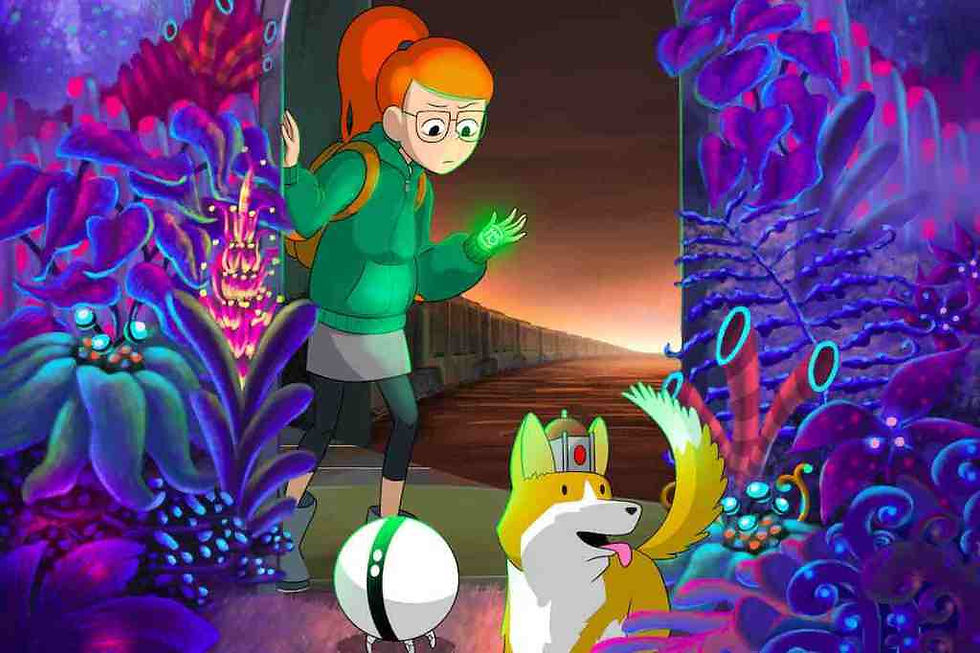A Review on Infinity Train – Shanna Sakata
- Shanna Miwa Sakata
- Feb 15, 2021
- 4 min read
Infinity Train is an animated series created by Owen Dennis and released by Cartoon Network in 2019. The epic is a sci-fi mystery that, as the name implies, takes place on a train that goes on forever. It has been, and continues to be, one of the most intriguing and heart-felt pieces of animated television I have ever seen in Westernized media.
Each season, officially regarded as “books,” follows a different protagonist and different storyline. Book 1 centers around Tulip Olsen (portrayed by Ashley Johnson) and her struggle to accept the changes in her life. After her parents’ divorce, she hesitates in adjusting to the separation and lashes out at their attempts at co-parenting. It is in this time of turmoil that she tries to make her own way to the video game camp they had to cancel taking her to. Through her experiences, we slowly unfold the mystery of the train- and the rapidly changing, glowing number on her hand. As she meets the denizens of the train, Tulip enlists accompaniment of One-One and Atticus. Tulip discovers One-One, voiced by Owen Dennis and Jeremy Crutchley, in her first car. He is a white, orbital robot that splits in half forming two personalities: Sad-One and Glad One. Atticus, the mighty corgi king voiced by Ernie Hudson, is another companion that the two of them meet in “The Corgi Car.” The rest of the season focuses on their collaborative efforts to help Tulip get off of the train.
Book 2 is the next part of the Infinity Train anthology. It regards the consequences of the first season’s seventh episode, “The Chrome Car,” in which Tulip released her reflection from the mirror world. The chrome girl offers the name “MT” to another passenger we meet in season two, named Jessie (Robbie Daymond). They befriend each other and their deer that they dub “Alan Dracula.” While it does follow the same ultimate goal of getting the passenger off the train, we see a lot more about the mechanics off the train; how the passengers arrive; and how society works. Much of the struggle is about Jessie being able to stand up for himself rather than to give into everyone’s will in an effort to be liked which; directly coincides with MT’s battle for autonomy and personhood.
Book 3, the latest installment of the saga, continues with the loose string regarding the Apex. They are a group of children who believe that the train was meant for passengers with numbers and completely disregard the lives of all others who live on it. The leaders, Grace (Kirby Howell-Bapstite) and Simon (Kyle McCarley), become separated from the Apex in the first episode. Through this partition, they are allowed to drift from the group-think they had previously bubbled themselves in. They encounter the adorable child known as Hazel (Isabella Ibiera) and her gorilla companion, Tuba (Diane Delano). Grace and Simon begin to understand the weight of their sentiments which causes numerous twists and turns throughout the season.
Infinity Train has the opportunity to be one for the most influential cartoons of the decade. Each season allows a cathartic release and a convincing thesis. For its younger audiences, it helps navigate more complex situations that they will all have to face in their lives such as: acceptance of change, identity, and societal discrimination. The writing staff handles all these subjects with care whilst not being afraid to pull punches from the true anguish that life isn’t perfect and that there are circumstances beyond our control. We cannot prevent change from happening, or the intolerance people have for our identities, nor the discrimination that seems imbued into our way of living but we can control our own being and how we regard those hardships. Infinity Train teaches us to be better people, despite circumstances.
One of the many reasons this show captures the hearts of its viewers is due to the impeccable characterizations of its cast. Each of the voice actors breathe life into their role and the writers add a distinct personality to the characters they put on screen. In this way, the story beats are reciprocated by the audience- every panicked moment by Tulip is our panic; every heart-wrenching moment of dehumanization to MT is our heart-wrenching moment; and every moment of Hazel’s fear is our own. One of the few qualms I have with this series is its pacing. The story begins a bit slow in its first season as it tries to establish aspects of the train. However, this may be due to Infinity Train’s 15-minute episode structure. Though it shows up once again at the start of Book 2, the writers quickly course-correct by the time Book 3 was released on HBO Max. Overall, the series is very cohesive and eloquently weaves in plot lines by utilizing its storytelling devices- leaving us wanting more.
Kaleena Rivera reviews Infinity Train in “‘Infinity Train’: The Best Science Fantasy Series No One is Watching.” She notes that the series “transcends age” with its thought-provoking topics and creative structure. She labels it as a “deeply sophisticated and stylish show.” It is difficult to find other reviews on the entirety of the show as the latest news reveals that the series is in significant danger of cancellation. However, those who are continuing to watch repeat with the same conviction, “Save Infinity Train!”




Comments